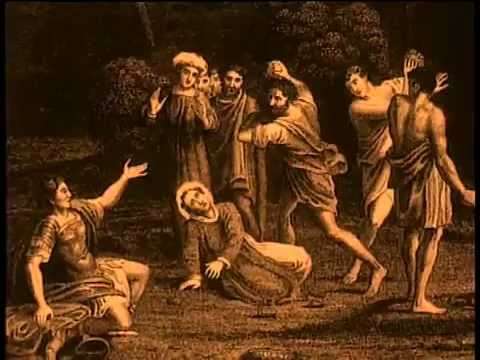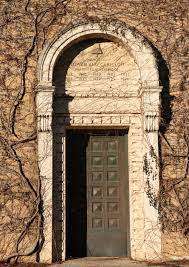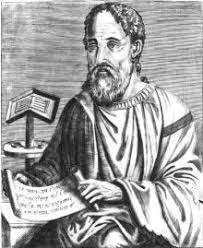

PERSECUTION IN THE BOOK OF ACTS
Pr. B. Saji
Persecution is the act of singling out, victimizing, harassing, oppressing or killing an individual or group because of racial, religious, ethnic or political differences.
Christians are persecuted because of their belief in Jesus Christ.
The Bible records persecution of God’s people in both the Old Testament and New Testament. The Pharisees persecuted Jesus because He did not follow their man made legalism. Following Christ’s death, resurrection and ascension, organized persecution of the early Church took place. One of the most zealous opponents was Saul of Tarsus, later known as the Apostle Paul. After Paul converted to Christianity and became a missionary, the Roman Empire began to terrorize Christians.
Paul was beheaded by order of the Emperor Nero, and the Apostle Peter was reported to have been crucified upside down in a Roman arena. Killing Christians turned into a form of entertainment in Rome, as believers were executed and set on fire.
THE RECORDS OF PERSECUTION IN THE BOOK OF ACTS
Luke the physician who authored the book of Acts, describes the picture of the early Christian community in Jerusalem. They experienced the forgiveness, the power of Holy Spirit while sharing the gospel outside of their fellowship. The Christian Church which received the wind of the Spirit, now started to face a perilous storm that shook the church’s very existence. The book of Acts deals with five different types of persecutions faced by the early Church. The following gives us a brief description of the same.
The persecution by the Sadducees: (Acts 4:1-32) they were the people who initiated the waves of persecution up on the church. They were the ruling class or the wealthy aristocrats who had political favour of the Romans. Theologically, they believed that the Messianic age had begun in the Maccabean period. They were not looking for a Messiah. They denied the doctrine of the resurrection of the dead which the apostles proclaimed in Jesus. Thus they considered the apostles as both agitators and heretics, disturbers of the peace and enemies of the truth. In consequence they were greatly disturbed (4:2). They treated the apostles as unprofessional unauthorized preachers.
The Chief of the temple police, who was responsible for maintenance of law and order, and the high priest put the apostle Peter and John in jail, because it was evening and could not convene the council. But the interesting thing is that, the Sadducees could not hinder the Word of God. Though the apostles were arrested, the gospel could not be confined. On the other side, many who heard the Word believed and the church began to grow (4:4).
The Sadducees persecuted the apostles because they were annoyed due to the healing of the cripple with Peter’s sermon. Just as the Pentecost event had been the text for his first sermon, so the cripple’s healing becomes the text for his second. Peter emphasized that Jesus was once rejected but now resurrected and reigning, and that Jesus made the crippled man strong. His sermon was a Christ centered one. Peter ended his sermon by exalting the name of Jesus. The devil cannot endure the exaltation of Jesus Christ, so he stirred up the Sanhedrin to persecute the apostles.
As a result, the apostles were brought before the council. They questioned, ‘By what power or what name they healed the crippled? (4:7). When the council was annoyed, Peter was freshly anointed with the Holy Spirit and answered that ‘it is by the name of Jesus Christ of Nazareth whom you crucified’. The court was astonished by the courage of Peter and John, who, though unschooled and ordinary men; realized that they had been with Jesus. They called the apostles and forbade them to speak or teach at all in the name of Jesus. To this prohibition the apostles replied that the court must judge ‘whether it would be right in God’s sight to obey them or God (4:19)’. The court threatened and allows them to go.
The Second Arrest and Trial: (Acts 5:17-42)The Sanhedrin heightens the persecution. The apostolic mission, particularly healing provoked the Sanhedrin. They felt that the apostles ignored the court’s prohibition and threats and thus they were angered by the failure of the first assault on the apostles. The Sanhedrin had strictly ordered them to abstain from teaching in the name of Jesus. The high priest and all his associates, who were members of the Sadducees decided to take further action. They arrested the apostles and put them in the public jail. (5:18) but during the night an angel brought them out and instructed them to proclaim the message of new life. On hearing the news, the captain and others were puzzled. In fact, the apostles disobeyed the Sanhedrin and obeyed God’s command. The captain of the temple and his officers re-arrested the apostles, and brought them before the Sanhedrin a second time for questioning.
The apostles answer was a mini-sermon. They uplifted Christ rather than defend themselves. Through this they announced that Christians are called to submit to human authorities, but if the authorities themselves misuse their God given power, the Christian’s duty is to disobey the human authority in order to obey God’s. The apostles stated that their primary responsibility is to obey God. Hearing the words of defense the council was furious, but Gamaliel, the Rabbi stood up and ordered the apostles to be put outside.
The apostles rejoiced in their tribulation because, it was an opportunity to demonstrate their loyalty to Christ and it was a real opportunity to share in the experience of Christ. It is true that “those who shared in the cross-bearing would share in the crown – wearing.”
Luke the author of Acts brought the account of the two waves of persecution which broke over the infant church. In the first, the Council issued a prohibition and warning, which led the apostles to pray to the Sovereign Lord for boldness to go on preaching. In the second they received a prohibition and a beating, which led them to praise God for the honour of suffering for Christ.
Stephen the Martyr (Acts.6:8 – 7:60): After the coming of the Spirit and the counter attack of satan, the church is ready to initiate its worldwide mission. This was the time for the gentile mission. So far the church had been composed only of Jews and restricted to Jerusalem. Now, the Holy Spirit is about to thrust his people into the wider world. Stephen-the Martyr, Philip-the evangelist, Saul- the Pharisee, Cornelius - the centurion, these four men contributed to the global expansion of the church.
Stephen the martyr came first. His preaching aroused Jewish opposition. His preaching could not convince the council and thus he was stoned to death. He had vision of a world for Christ, for that he defended the truth as condemnation of his own nation. He uses the panoramic view of Jewish history.
Through his message Stephen announced them guilty of sinning against the Holy Spirit, the Messiah and the law. The Sanhedrin infuriated by his accusations, gnashed their teeth at him. Snarling like wild animals. But Stephen was full of the Holy spirit looked up to heaven and had the vision of the glory of God, and he could see that the heaven opened and the Son of man standing at the right hand of God. The persecutors rushed at him, dragged him out of the city and began to stone him. Stephen uttered ‘Lord Jesus receive my spirit and lastly he uttered ‘Lord do not hold this sin against them’. Stephen was the first Christian martyr.
Havoc of the Church: - Stephen’s martyrdom brought a great persecution against the church at Jerusalem. The death of Stephen was the signal for an outbreak of persecution which compelled the Christians to scatter. All except the apostles were scattered throughout Judea and Samaria. Before the ascension of Jesus Christ, He commanded his disciples,”you will receive power: and you will be my witnesses both in Jerusalem, and all in Judea and in Samaria, and to the uttermost part of the world” (Acts 1:8). Even after hearing this commandment, the disciples remained in Jerusalem; but now the commission was fulfilled as a result of persecution. The dispersion now resulted in wide spread evangelism. The dispersed Christians scattered the good seed of the gospel. They preached the Word where ever they went. The devil’s attack (persecution) had the opposite effect to what he intended. Instead of smothering the gospel, persecution succeeded only in spreading it. “ The wind increases the flame”.
Saul who had approved of Stephen’s stoning now began to destroy the church, a brutal and sadistic cruelty, making a house-to-house search for believers; he dragged off men and women and put them in prison. He did not spare the women, but he did not stop short of seeking and securing his victims’ death ( 9:1, 22:42, 26:10) Saul made havoc of the church. His was a brutal cruelty. Acts of the apostles and the epistles describe how Saul a member of Sanhedrin and a Pharisee, persecuted the church. He killed the saints (8:1,9:1), Threatened (9:1) bringing them bound unto Jerusalem (9:2), hath done many evils to saints (9:13), persecuted (22:4), do things contrary to the name of Jesus (26:9) shut up in prison and gave voice against them (26:10), a blasphemer and compelled others to blaspheme (26:11, 1 Timo.11:13), persecuted the church and wasted it (Gala.1:13).
Saul was converted to Christianity. This was not a sudden conversion but a sudden surrender. Saul might have asked himself that ‘what secret these simple people had which made them face peril and suffering…..” The persecutions to the church and the martyrdom of Stephen drew Saul near to the risen Christ. Then onwards he became a man who ceased to do what he wanted to do and began to do what Christ wanted of him.
A new wave of persecution upon leaders: (Acts.12:1-10) It was instigated by King Herod. This was Herod Agrippa, the son of Aristobulus. Luke describes the death of James and imprisonment of Peter, both of them were apostles and leaders of the Jerusalem church. Herod Agrippa I killed James, but Peter was rescued by the intervention of God. The early church realized the destructive power of Herod and the saving power of God. Throughout the history of the church, they grasped the expansion and opposing, growth and shrinkage, advance and retreat. But it is very clear that the powers of death and hell will never prevail against Christ’s church since it is built on the Rock.
There is a possibility to think that Peter will not escape from this persecution as he was guarded by four quaternions of soldiers. Peter was chained both hands and soldiers were kept watching on him. In spite of impossibility of liberation, the hand of God definitely worked for peter and he escaped from all perils.
Book of Acts very clearly and vividly explains various persecutions faced by the early church, and how the risen Christ helped them in their difficulties. As a concluding word, may I state the attitude of the early Christians in the midst of all these troubles.
(i) They prayed: they lifted up their voice with one accord (4:24), the church prayed without ceasing (12:5) Paul with Silas while he was in jail, prayed (16:25)
(ii) They obeyed God rather than men (5:29)
(iii) They were counted worthy to suffer shame for his name (5:41).
(iv) The departed the council rejoicing (5:41)
(v) Looked up steadfastly into heaven (7:55). They saw the glory of God and Jesus standing on the right hand of God.
(vi) They sang praises into God (16:25)
(vii) The Word of God preached and church began to grow.(8:4)
During this period, the church faces persecution from all areas. When we go through perils, persecutions, difficulties, let us follow the example of our Master and that of our forefathers.





